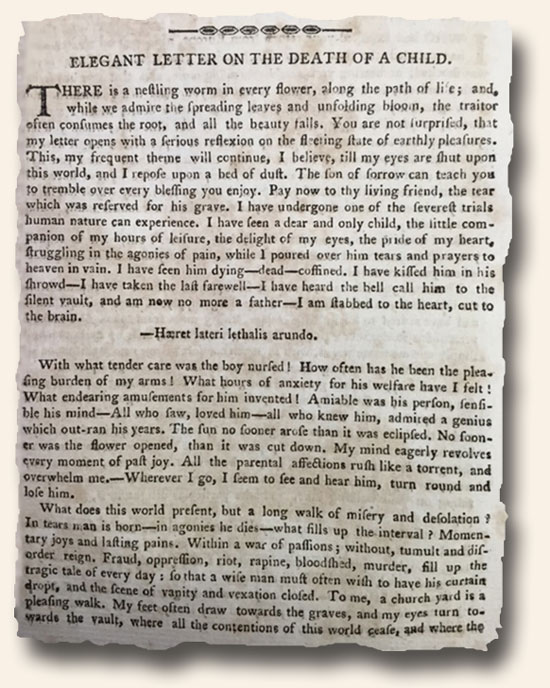A curious find that lead to more than expected…
July 25, 2016 by TimHughes · Leave a Comment
Although not a poetry aficionado, I am aware that “Leaves Of Grass” by Walt Whitman is considered a seminal work in 19th century literature. So when I stumbled across a small article on page 7 of a New York Tribune issue dated Oct. 10, 1855 I took a moment to read it. Most of the report is taken up with a letter signed in type: R. W. Emerson, so my interest was piqued.
After a number of Google searches I discovered this report to be much more significant that I might have thought.
Although considered highly controversial during his era, “Leaves of Grass” has infiltrated popular culture & been recognized as one of the central works of American poetry. As such, the article is interesting, mentioning in part: “…call the attention of our readers to this original & striking collection of poems, by Mr. Whitman…could not avoid noticing certain faults which seemed to us to be prominent in the work. The following opinion, from a distinguished source, views the matter from a more positive and less critical stand-point:…” and what follows is the famous letter by Ralph Waldo Emerson–who inspired this work by Whitman–in which he comments: “…I find it the most extraordinary piece of wit and wisdom America has yet contributed…I am very happy in reading it, as great power makes us happy…” and even more, signed in type: R. W. Emerson. This original letter is in the Library of Congress.
This letter’s appearance in the Tribune would seem to be the only newspaper printing of the time, as records indicate that the: “…letter to Whitman from Ralph Waldo Emerson, 21 July, 1855 is among the most famous letters ever written to an aspiring writer…Without asking Emerson’s permission, Whitman gave this private letter to Charles Dana [managing editor of the New York Tribune] for publication in the New York Tribune on October, 1855.” (see this hyperlink).
A broken heart… 200+ years ago… today?
February 27, 2015 by GuyHeilenman · Leave a Comment
Anguish… deep sorrow… pain and emptiness that engulf and suffocate… As the saying goes: “The more things change, the more they stay the same.” No matter how far we advance as a race over time, the death of a loved one elicits the same paralyzing emotions today as it did 100… 1000… 5,000 years ago, and will continue to do so as long as humanity walks this earth. Such is the case (in spades) with a parent’s crushed spirit upon the loss of a child. While searching through an original printing of The American Magazine, Philadelphia, dated May, 1792 in the hopes of finding historical content, I came across the printing of a letter from a Father who was trying to come to terms with the untimely loss of his child. Language usage and expression aside, this letter written 200+ years ago could easily have been written yesterday. It also made me thankful for a hope beyond the grave – a hope that shouts from a Father’s pen as he attempts to express his heart… his love… his hope:
The Traveler… Johnson’s “Great Society”… death of a poet…
January 5, 2015 by The Traveler · Leave a Comment
Today I traveled back to January 5, 1965 by way of The Springfield Union, Massachusetts (January 5, 1965). There I found the reporting of President Johnson’s  State-of-the-Union message in which he presented several new programs. “…These are all parts of the Johnson design for a ‘Great Society’, he hopes will develop through decades ahead… the search begins for a way to ‘elevate the quality of our civilization.’…” This was to be for a better health care program for the elderly under the Social Security, to help develop regions suffering from distress and depression, new education programs, and more.
State-of-the-Union message in which he presented several new programs. “…These are all parts of the Johnson design for a ‘Great Society’, he hopes will develop through decades ahead… the search begins for a way to ‘elevate the quality of our civilization.’…” This was to be for a better health care program for the elderly under the Social Security, to help develop regions suffering from distress and depression, new education programs, and more.
Also in the issue was the report of the death of poet and playwright T. S. Eliot. He won the Nobel Prize in literature in 1948 “for his outstanding pioneer contribution to present-day poetry”. His book of poetry “Old Possum’s Books of Practical Cats” is what the musical “Cats” was based on, which has been the third longest running show in Broadway history.
~The Traveler
A lament of a dying soldier…
December 13, 2013 by TimHughes · Leave a Comment
Occasionally the human side of war comes through in the newspapers of the day, giving hard evidence of the tragedy of lost life and how it affects those back home. The front page of the: “Hammond Gazette” from Point Lookout, Maryland, Jan. 27, 1864, contains a poem titled “Who Will Care for Mother Now?” (see below) It reflects the sorrows & concerns of a dying soldier, and obviously attracted much attention as the internet is full of references to this poem, which at some point was to music as well.





